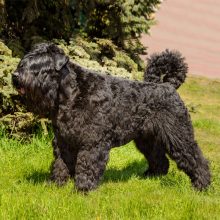Bouvier Des Flandres
Lifestyle Needs

The Bouvier Des Flandres is a large, rugged, powerful dog, who supposedly once herded and protected cattle. He is a sociable dog who will protect his home and human family, and because of his size and strength will need training and firm handling. He has a rough, shaggy type coat which will need frequent grooming and the occasional professional trimming in order to keep the hair out of his eyes. He needs to live in a large house with a garden and should have plenty of exercise.
Genetic Diversity
(Known as Coefficient of Inbreeding: 'COI'. It should be as low as possible.)
The UK Kennel Club breed average COI is 8.3% - See 'A Beginners Guide to COI'
Gene Pool Size
(Known as Effective Population Size: 'EPS')
133.1
EPS is a measure of how many individuals are contributing genetically to a breed population. It is a measure of the size of the gene pool in a breed. Lower than 100 is considered critical by conservationists and below 50 brings a breed close to extinction. For more information see the Kennel Club article.
Health and Welfare Problems due to Conformation
(Body shape and physical characteristics)
- The Bouvier’s coat could cause welfare problems if not given regular grooming and attention.
BVA/KC Health Schemes: www.bva.co.uk/chs
- Hip dysplasia: breed 5 year mean score 11.6 (parents should be lower)
- Elbow dysplasia: ideally 0:0
- Eye Scheme: full ophthalmological testing required before breeding
Estimated Breeding Values (EBVs) : No EBVs are currently available for this breed
www.thekennelclub.org.uk/about-ebvs
DNA Tests Available
DogWellNet and IPFD Harmonisation of Genetic Testing for Dogs (HGTD)
www.dogwellnet.com/breeds
- Exercise-Induced Collapse
Availability of a DNA test does not mean that it is always necessary or even desirable for breeders to use this test.
Other Breed-Specific Health Screening Schemes
None known
Ask the breeder to show you the certificates for the above tests/screening for both parents. If any of the above tests have not been considered necessary by the breeder (and there may be good reasons), ask her to explain why.
Other Diseases Reported
(For which there are currently no genetic or screening tests for sire or dam)
- Muscular dystrophy of pharangeal and oesophageal muscles causing dysphagia
- Laryngeal paralysis – polyneuropathy syndrome
- Cancer: gastric carcinoma; prostatic carcinoma
- Shoulder osteochondrosis
Ask the breeder about the medical history of the parents, grandparents and great grandparents. Consider carefully whether to purchase a puppy if some of these or other diseases are in the family line.
Ask about the breeder’s policy in cases of serious genetic diseases occurring to your puppy in later life. Good breeders will request to be informed of such events in order to improve future breeding decisions.
You are strongly advised to buy from a breeder who uses (or is prepared to use) the AWF Puppy Contract and Puppy Information Pack (PIP): www.puppycontract.org.uk
The breeder should also be familiar with the CFSG/DBRG Code of Practice for Dog Breeding